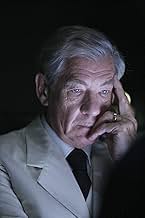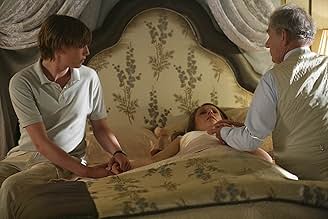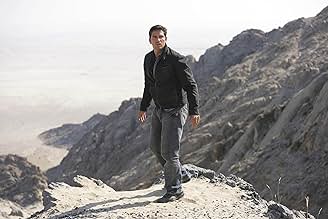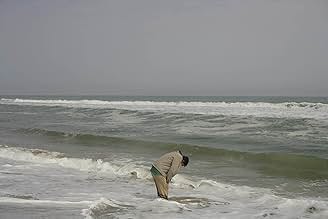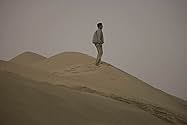The Prisoner
- टीवी मिनी सीरीज़
- 2009
- 45 मि
अपनी भाषा में प्लॉट जोड़ेंAn update to the cult favorite series from the 1960s about a government agent who is kidnapped and sent to a remote island known as "The Village."An update to the cult favorite series from the 1960s about a government agent who is kidnapped and sent to a remote island known as "The Village."An update to the cult favorite series from the 1960s about a government agent who is kidnapped and sent to a remote island known as "The Village."
- 2 प्राइमटाइम एमी के लिए नामांकित
- 10 कुल नामांकन
एपिसोड ब्राउज़ करें
फ़ीचर्ड समीक्षाएं
OK, I get the concept that the AMC production is in no way a sequel-type update to the 60's TV show. No argument there.
But--and I am sincere--can anyone actually provide me (and probably MANY others) with a detailed story line? A CLEAR plot summary? The writers/producers obviously wanted to keep viewers guessing and engaged, but there was never enough detail to determine which were flashbacks and which were...something else. And the last chapter was way too obtuse. It's fine that parts of the series wanted to comment on grand themes and deep societal concepts like the original did, in a modern way, but a more sharply-defined story line could easily do that, and probably hold everyone's attention longer. (Note: I can't buy into any explanation that says "It was all an allegory...it's whatever you think it means." There was enough of that already built-in to each episode.)
The pacing was awfully slow. The whole story could have been told well in 4 hours instead of 6. I found myself starting to want more unexplained holes in the sand and explosions just to pick up the action a bit.
You don't suppose that this was all an evil trick, the creation of a wicked team, to get us to watch all the episodes and then realize that WE were the prisoners for six hours?
But--and I am sincere--can anyone actually provide me (and probably MANY others) with a detailed story line? A CLEAR plot summary? The writers/producers obviously wanted to keep viewers guessing and engaged, but there was never enough detail to determine which were flashbacks and which were...something else. And the last chapter was way too obtuse. It's fine that parts of the series wanted to comment on grand themes and deep societal concepts like the original did, in a modern way, but a more sharply-defined story line could easily do that, and probably hold everyone's attention longer. (Note: I can't buy into any explanation that says "It was all an allegory...it's whatever you think it means." There was enough of that already built-in to each episode.)
The pacing was awfully slow. The whole story could have been told well in 4 hours instead of 6. I found myself starting to want more unexplained holes in the sand and explosions just to pick up the action a bit.
You don't suppose that this was all an evil trick, the creation of a wicked team, to get us to watch all the episodes and then realize that WE were the prisoners for six hours?
Would anyone really want to see a verbatim remake of a 1960s TV series? C'mon people, spies? It's not the cold war. Let the new series explore themes of paranoia, subversion, and identity in a new, interesting, and CURRENT context. At the same time it's adding new mystery. Part of the fun is figuring out what's going on. I wouldn't want a replica mystery and therefore be spoiled. I applaud the update, its creepy, technically sound, and confusing as hell. Granted, the acting is not top notch, Caviezel is doing the best he can but can't carry it, although McKellen and Ruth Wilson are great. Is it perfect? No. But does it deserve 1-2/10 just because it doesn't mimic its predecesor? C'mon people stop living in the past.
Movie kept my interest. It separates from the original series in numerous ways. I would have preferred a closer match. That said, I thought the approach to this was still OK, and kudos to the actors who did a very nice job.
However, this remake failed with the ending of the movie. I won't spoil it. I believe the audience is left with just not believing the main character would act that way -- based on the story's own construction of the character. A story can take any twist, which is is fine, but if it makes a character act "out of character" one loses faith in the story. In this case, there is no justification for the ending based on what was seen. Unfortunate writing at the end.
However, this remake failed with the ending of the movie. I won't spoil it. I believe the audience is left with just not believing the main character would act that way -- based on the story's own construction of the character. A story can take any twist, which is is fine, but if it makes a character act "out of character" one loses faith in the story. In this case, there is no justification for the ending based on what was seen. Unfortunate writing at the end.
Too much dialog written in the most obvious fashion. Too little mystery. Too little tension. The essential drama and motivation of the story missing as much as No. 6's mind.
The issues with this series have less to do with its similarity or non-similarity to its source material than it has with the tenor of contemporary film-making and writing. Classicism and all its artistic forms have all but disappeared from education, so it is not surprising that what passes off as entertainment today is hardly groundbreaking or even interesting. There are exceptions to the rule, of course, but by and large episodic television is at a low point.
It isn't even so much that Prisoner 2.0 differs from the original (in itself not necessarily a bad thing if handled properly) but the fact there is little personality to the proceedings is its major weakness.
Film-making, collaborative or auteur, rely on the singular voice of its many artists ringing out in concert, guided by the deliberate hand of a producer or director who sees the forest for the trees. Film-making is about style as much as about content and the two have to cohere meaningfully. When it doesn't, as in this new reboot, the results are muddled.
The presence of Ian McKellen isn't enough to elevate it and Caviezel simply miscast.
Too bad.
The issues with this series have less to do with its similarity or non-similarity to its source material than it has with the tenor of contemporary film-making and writing. Classicism and all its artistic forms have all but disappeared from education, so it is not surprising that what passes off as entertainment today is hardly groundbreaking or even interesting. There are exceptions to the rule, of course, but by and large episodic television is at a low point.
It isn't even so much that Prisoner 2.0 differs from the original (in itself not necessarily a bad thing if handled properly) but the fact there is little personality to the proceedings is its major weakness.
Film-making, collaborative or auteur, rely on the singular voice of its many artists ringing out in concert, guided by the deliberate hand of a producer or director who sees the forest for the trees. Film-making is about style as much as about content and the two have to cohere meaningfully. When it doesn't, as in this new reboot, the results are muddled.
The presence of Ian McKellen isn't enough to elevate it and Caviezel simply miscast.
Too bad.
1967's Cold War and its counter culture are gone; they've been replaced by 2009's global village and its consumer culture. So 2009's Prisoner is no longer an angry young man fighting for his identity against secret government policies and flagrant brainwashing, he's an angst-ridden 30-something trying to hang on to his identity in the face of overwhelming marketing and soothing pharmaceuticals.
2009's The Prisoner takes all the familiar elements of 1967's cult classic and re-interprets them in a relevant way, just like good remakes are supposed to. The psychedelic, lava-lamp surrealism of the sixties may be gone, but, don't worry, they've been replaced by the post-modern, dream-like surrealism of the oughts.
Yes, the Village still needs to assimilate No. 6, but it no longer cares why he would wish to resign from its society, it only wants him to understand that he can't. Instead of foiling No. 6's repeated escape attempts from the superficially charming, but inherently oppressive, Village, this new Village, still just as pleasant-looking, and oppressive, just makes it clear that there is no place else to escape to. The consumer culture and its global village are everywhere now. There is no escape.
So, instead of a government desperately trying Pavlovian conditioning, hypnotic suggestion, and hallucinogens in the water, a corporation tries matching people with their perfect mates, giving them mind-numbing jobs to take their minds off their melancholy, distracting them with melodramatic soap operas, and, maybe, making them feel a little better with some gene-therapy.
Sure, everyone's still under surveillance in this Village, but this time, its not the Village government trying to identify revolutionaries so it can silence them, its the Summakor corporation trying to identify dreamers so it can subject them to a concentrated dose of consumer culture. And if that doesn't work, maybe a few pharmaceuticals and a promotion will co-opt the more troublesome ones.
2009's The Prisoner takes all the familiar elements of 1967's cult classic and re-interprets them in a relevant way, just like good remakes are supposed to. The psychedelic, lava-lamp surrealism of the sixties may be gone, but, don't worry, they've been replaced by the post-modern, dream-like surrealism of the oughts.
Yes, the Village still needs to assimilate No. 6, but it no longer cares why he would wish to resign from its society, it only wants him to understand that he can't. Instead of foiling No. 6's repeated escape attempts from the superficially charming, but inherently oppressive, Village, this new Village, still just as pleasant-looking, and oppressive, just makes it clear that there is no place else to escape to. The consumer culture and its global village are everywhere now. There is no escape.
So, instead of a government desperately trying Pavlovian conditioning, hypnotic suggestion, and hallucinogens in the water, a corporation tries matching people with their perfect mates, giving them mind-numbing jobs to take their minds off their melancholy, distracting them with melodramatic soap operas, and, maybe, making them feel a little better with some gene-therapy.
Sure, everyone's still under surveillance in this Village, but this time, its not the Village government trying to identify revolutionaries so it can silence them, its the Summakor corporation trying to identify dreamers so it can subject them to a concentrated dose of consumer culture. And if that doesn't work, maybe a few pharmaceuticals and a promotion will co-opt the more troublesome ones.
क्या आपको पता है
- ट्रिविया"Be seeing you" is a commonly-heard phrase in The Prisoner (1967), this movie, and was also one of Patrick McGoohan's catchphrases in Danger Man (1960) and Danger Man (1964) . McGoohan's character "Johnny Cousin" (a pot-smoking drummer) in All Night Long (1962) uses the phrase also when he says goodbye to the road manager "Berger" towards the end of the movie.
- कनेक्शनFeatured in A Six Hour Film Shot in 92 Days: The Diary of 'The Prisoner' (2010)
टॉप पसंद
रेटिंग देने के लिए साइन-इन करें और वैयक्तिकृत सुझावों के लिए वॉचलिस्ट करें
- How many seasons does The Prisoner have?Alexa द्वारा संचालित
विवरण
- चलने की अवधि
- 45 मि
- रंग
- पक्ष अनुपात
- 1.78 : 1
इस पेज में योगदान दें
किसी बदलाव का सुझाव दें या अनुपलब्ध कॉन्टेंट जोड़ें



